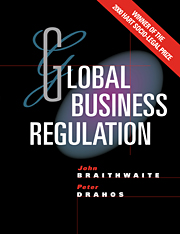3 - Method
Published online by Cambridge University Press: 04 August 2020
Summary
Interviews and Informants
The domains of regulation chosen were those that a previous national study (Grabosky & Braithwaite 1986) had identified as the domains covered by the most important 101 business regulatory agencies in Australia. That study warranted some claim to being systematic in its coverage of the most consequential fields of regulation. As the most comprehensive study of the business regulatory agencies of a single nation, it laid a foundation for the sweep of this global study of regulation. Second, sticking with the same domains meant that one of the authors began this study with knowledge from having interviewed top regulators in ninety-six regulatory agencies and read all acts and key policy documents, for at least one country. Third, we could ask those national regulators who were the crucial players at the global level for us to interview.
As our interviews and reading proceeded, new types of actors emerged as important in shaping the globalization of different forms of regulation. Similarly, it became clear that the actors recurrently mentioned some principles in explaining what the globalizers were pursuing or the resisters were resisting. Our interviews therefore made sense of a view that globalization might be understood as a contest of principles. We are not the only scholars to reach this conclusion: for example, Meyer (1994: 128ff) and Teubner (1997) describe the resilient softness of the Lex Mercatoria as ‘more a law of values and principles than a law of structures and rules’ (Teubner 1997: 21). Finally, our informants spoke of what we came to call ‘mechanisms of globalization'. The research was able to identify recurrently important mechanisms.
A deficiency in selecting what contemporaries regard as the most important domains of regulation for study today is that we neglect forms of regulation that were more important in an earlier era. For example, the regulation of postal services is not included, yet it was probably the first elaborate form of business regulation to develop. Globalization of this industry's regulation works so smoothly today that we take it for granted. The Persian empire 2500 years ago set up a sophisticated system for regulating mail deliveries (Luard 1977: 11). Roman, Arab and Habsburg (under the entrepreneurship of Franz von Taxis) international regimes followed. In 1670 there was a postal treaty between England and France.
- Type
- Chapter
- Information
- Global Business Regulation , pp. 11 - 14Publisher: Cambridge University PressPrint publication year: 2000
- 1
- Cited by

